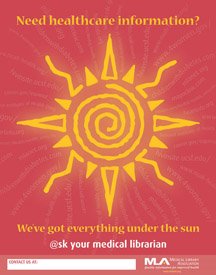 October is National Medical Librarians Month, and in honor of that observation, I'd like to share some information about my work and the work of medical librarians in general.
October is National Medical Librarians Month, and in honor of that observation, I'd like to share some information about my work and the work of medical librarians in general. From the Medical Library Association's brochure, Medical Librarianship: A Career Beyond the Cutting Edge" (PDF):
What is a medical librarian?
"Medical librarians provide health information about new medical treatments, clinical trials and standard trials procedures, tests, and equipment to physicians, allied health professionals, patients, consumers, and corporations. They help physicians provide quality care to patients, help patients find information, answer consumers’ questions, and provide information to the health care industries.
Medical librarians become Web managers, medical informatics experts, and chief information officers as well as catalogers, instructors, and reference librarians. A medical librarian needs a graduate degree in library or information science." [As well as additional subject knowledge in the health sciences and specialized training on medical information resources. For more information on the skills librarians need and where the work, see the brochure]
So what does your medical librarian blogger do all day?
My role has evolved over time, as I have gained new skills and progressed in my training. I've done circulation and reference, managing digital resources, producing data and materials for the budget, web updates, weeding collections, proposal-writing, and a whole host of other activities, depending on what was needed. Right now, I'm spending a lot of time working on clinical questions in support of our physicians and other healthcare providers. This involves carefully searching the medical literature for well-designed clinical research in order to provide evidence related to drugs, procedures, treatments, and conditions. I (and other librarians) locate relevant research, summarize the findings, and report back to the clinicians to inform their patient care.
For example, here are a few questions I have worked on over the past couple of months:
You might think all of this information would be in textbooks, but it isn't, and if it is, it's likely out of date and omits the most current research. To find resources to answer these questions requires searching of online medical citation databases, hand-searching of references, reading and understanding the articles, assessing methodological rigor, and winnowing to the best, strongest, and most relevant research, which is then summarized to highlight the key findings for our busy clinicians. Medical librarians are a keystone in evidence-based medicine, because clinicians suffer from busy schedules, information overload, and simply do not have the finding expertise librarians possess. Do you hope your doctor is keeping up with literature on diabetes (or whatever condition is relevant to you)? A PubMed search for articles on diabetes published in just the last year turns up more than 4,000 results. An Institute of Medicine report states that, "Substantial investments have been made in clinical research and development over the last 30 years, resulting in an enormous increase in the medical knowledge base and the availability of many more drugs and devices. Unfortunately, Americans are not reaping the full benefit of these investments. The lag between the discovery of more efficacious forms of treatment and their incorporation into routine patient care is unnecessarily long, in the range of about 15 to 20 years (Balas and Boren, 2000). Even then, adherence of clinical practice to the evidence is highly uneven." You can see how the help of an expert searcher and evaluator could come in handy for finding the right information at the right time. With the help of medical librarians, clinicians can get access to just the right resources to inform their patient care.
For a list of other medical librarian bloggers, see this LIS Wiki. A couple of my favorites, in no particular order: David Rothman; Clinical Evidence, Searching Tidbits, and Other Minutiae; The Krafty Librarian; Medlibrarian.net.
Technorati Tags: librarians; medical librarians; National Medical Librarians Month
MeSH Tags: Librarians

No comments:
Post a Comment